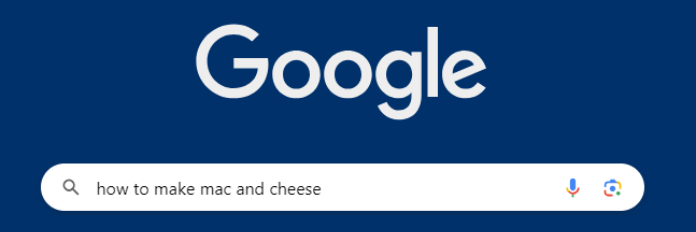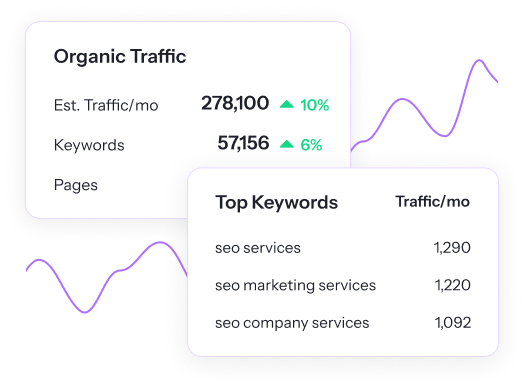Every day, Google processes around 8.5 million search queries from people trying to meet a need. Search queries are the words we type into Google’s search bar, and they’re made up of keywords. Keywords form the foundation of every search engine optimization (SEO) strategy, as they help get content to people actively searching for it.
If you’re looking to dive into the world of SEO to improve your website, keywords are one of the first concepts you should understand. Learn more about keywords, the different types, and why they’re so important in this guide. When you’re done, check out even more SEO tips in our blog!
What are keywords in SEO?
A keyword can be called multiple things — such as a search query, SEO keyword, or focus keyword — but they’re essentially just words and phrases users type into search bars to find what they’re looking for. An example of a keyword is “Google,” which, interestingly enough, was the most searched word on Google in 2023.
Keywords can be a single word or a string of words — also known as a key phrase. Regardless, keywords have a few categorization options that make them easier to understand and group, which we’ll discuss in the following two sections.

What are the types of keywords?
One way to classify keywords is according to their length. Depending on how long they are, we can put all keywords into one of two main categories:
- Short-tail keywords: These keywords are only one or two words long. Our previous example of “Google” is a short-tail keyword, but “denim shorts” would be another example.

- Long-tail keywords: A long-tail keyword contains three or more words and is sometimes a full sentence. They are naturally more specific due to their length. For example, someone may search for “best Italian restaurants in New York,” which is more detailed than “best restaurants.”

So, which one is better? Long-tail keywords are much easier to rank for than short-tail keywords. This is because they’re specific, so they have clearer search intent and are easier to target.
What is keyword search intent?
When you search for something on Google, you already have some idea of what you need, whether that’s information, a specific website, or a product. The reasoning or goal behind your search query is called search intent or user intent.
A user’s search intent will guide their keyword choice, so we can analyze keywords to determine search intent. There are four main types of keyword search intent:
- Navigational: The user is looking for a specific website, such as “Facebook.”
- Informational: The user needs more information and may search “how to bake a cake.”
- Commercial: The user is searching for specific information to make a purchase, like “gyms near me.”
- Transactional: The user is looking to make a purchase and may search for “couches for sale.”
Why do keywords matter in SEO?
Now you know what keywords are, the different types, and how search intent helps us understand the goal behind them. But why do you need keywords?
Keywords are the most important part of SEO. Learn why and how they will help your website below.
1. Improve search engine rankings
When search engines receive a search query, they use the keywords in it to find relevant content that matches both the user’s search intent and the topic. It then creates a list of links for the searcher to choose from. With SEO, the main goal is to get your website high up on those search engine results pages (SERPs).
By studying keywords and finding ones that match your business offerings and expertise, you can incorporate them into relevant existing pages and new content. These pages will have a better chance of ranking higher on SERPs because they match the search keywords and are helpful to the searcher.
2. Increase website traffic
Over 68% of all website traffic comes from search engines, as this is where people go to help them make decisions or find more information. Your site may look amazing and have great content, but without keyword integration, Google won’t show it high up on SERPs.
When you optimize your website by incorporating keywords throughout, you’ll start to see your SERP rankings go up. This pushes your website higher on the list of links, and more people will see it. Higher rankings increase your chances of people clicking on your website, and with more people visiting, your website traffic will grow.
Let’s Drive Results Together 
3. Inform content strategies
You can create a website or blog full of content and get very little traffic if you don’t consider keywords. Keywords help us understand what people are looking for, and when you create content to satisfy their search query, Google and other search engines will show your website to more people.
Use keywords as a guide to inform the content you create for your website, and modify existing pages to match up with keywords you want them to rank for. Remember that relevance is key — if your site ranks well for a keyword but doesn’t meet the searcher’s intent or need, they’ll click off quickly to find something better.
Need help finding keywords?
A keyword-focused SEO strategy is one of the best things you can have to get more website traffic and increase sales. However, it requires extensive keyword research and keyword optimization.
At SEO.com, we have all the resources you need to grow your knowledge of SEO topics, such as keywords. Check out our ultimate keyword research guide today to learn how to find the right keywords for your website. Also, take a look at our beginner’s SEO guide to discover more about SEO in general.
Ready to take your SEO to the next level? Discover keyword opportunities, track competitors, audit your website and more with SEO.com. Try SEO.com for free today to get immediate insights!
Discover Your SEO Potential
Pinpoint opportunities on your website faster and increase your visibility online with SEO.com!
If you’d like to leave all the keyword work up to the professionals, view our SEO services and contact us to get a free SEO proposal! WebFX — the company behind SEO.com — has helped thousands of businesses get real results through SEO, and we’d love to do the same for you.

Cut Your SEO Time in Half
with your new favorite user-friendly SEO tool
Writers

Related Resources
- What Are Breadcrumbs? Definition and How to Use Them
- What Are Featured Snippets?
- What Are Google Search Partners in Google Ads?
- What Are Hreflang Tags? A Quick Guide
- What Are KPIS and Why Do They Matter?
- What Are Meta Keywords and Should I Use Them?
- What Are Nofollow Links? How Nofollow Links Affect SEO
- What is a 301 Redirect? When & How to Use Them
- What is a 302 Redirect? Comparing 302 vs. 301 Redirects
- What is a Search Crawler? Your Ultimate Guide to Search Bots



